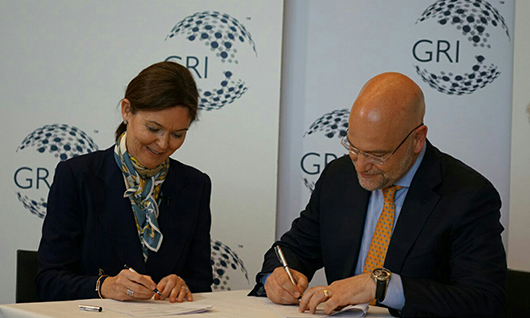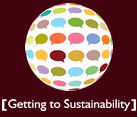 20 May 2016, Amsterdam. Today the UN Global Compact and GRI have announced a renewed Memorandum of Understanding. The signing took place at the 5th GRI Global Conference. The groups will continue collaboration over the next three years, notably in support of the United Nations Sustainable Development Goals (SDGs).
20 May 2016, Amsterdam. Today the UN Global Compact and GRI have announced a renewed Memorandum of Understanding. The signing took place at the 5th GRI Global Conference. The groups will continue collaboration over the next three years, notably in support of the United Nations Sustainable Development Goals (SDGs).
In joining forces, the UN Global Compact, as the world’s largest corporate sustainability initiative and main United Nations initiative for engagement with the private sector, and GRI, as the global standard-setter for sustainability reporting and issuer of the most widely used sustainability reporting standards in the world, play an important role in shaping private sector contributions towards sustainable development and the Sustainable Development Goals.
“We are pleased to renew our long-standing and essential collaboration with GRI on sustainability reporting,” said Lise Kingo, Executive Director of the UN Global Compact. “Together we can help companies measure and report on their efforts around the new Sustainable Development Goals, in ways that both show impact and are aligned with emerging best reporting practices.”
“Through our partnership with the UN Global Compact we can continue to scale up our collective efforts and have a greater impact on sustainable development issues, which include reaching and mobilizing small to medium enterprises around the world. They play a crucial role in the global economy,” said Michael Meehan, Chief Executive of GRI. “Increasing transparency of information is essential for building trust in both emerging and developed economies.”
To further Sustainable Development Goal 17 on a global partnership towards sustainable development, the UN Global Compact and GRI will work towards aligning responsible business practices with the Goals. The organizations will provide their respective business networks with guidance and robust frameworks. For example, these include the Sustainable Development Goals Compass. They seek to advance, report and communicate private sector contributions to the Goals. In addition they will also actively participate in the High Level Political Forum at the United Nations.
In renewing their partnership, the UN Global Compact and GRI reaffirm a set of shared values as follows:
- A commitment to advancing responsible business practices;
- A commitment to promoting and enabling positive private sector’s contributions towards sustainable development, while reducing and addressing negative impacts;
- An understanding that accountability and transparency are a key means of advancing responsible business practices; and
- The desire to make meaningful disclosure of sustainability information standard practice for all businesses.
The two organizations will also continue to collaborate on local outreach and training to increase the quantity and quality of reporting, with a special focus on less-developed markets and small and medium-sized companies.
About the UN Global Compact and GRI
About GRI
GRI is an international independent organization that has pioneered corporate sustainability reporting since 1997. GRI helps businesses, governments and other organizations understand and communicate the impact of business on critical sustainability issues such as climate change, human rights, corruption and many others. With thousands of reporters in over 90 countries, GRI provides the world’s most trusted and widely used standards on sustainability reporting, enabling organizations and their stakeholders to make better decisions based on information that matters. Currently, 40 countries and regions reference GRI in their policies. GRI is built upon a unique multi-stakeholder principle, which ensures the participation and expertise of diverse stakeholders in the development of its standards. GRI’s mission is to empower decision-makers everywhere, through its standards and multi-stakeholder network, to take action towards a more sustainable economy and world.
About the UN Global Compact
The United Nations Global Compact is a call to companies everywhere to align their operations and strategies with ten universally accepted principles in the areas of human rights, labour, environment and anti-corruption, and to take action in support of UN goals and issues embodied in the Sustainable Development Goals. The UN Global Compact is a leadership platform for the development, implementation and disclosure of responsible corporate practices. Launched in 2000, it is the largest corporate sustainability initiative in the world, with more than 8,000 companies and 4,000 non-business signatories based in over 170 countries, and more than 85 Local Networks. www.unglobalcompact.org
